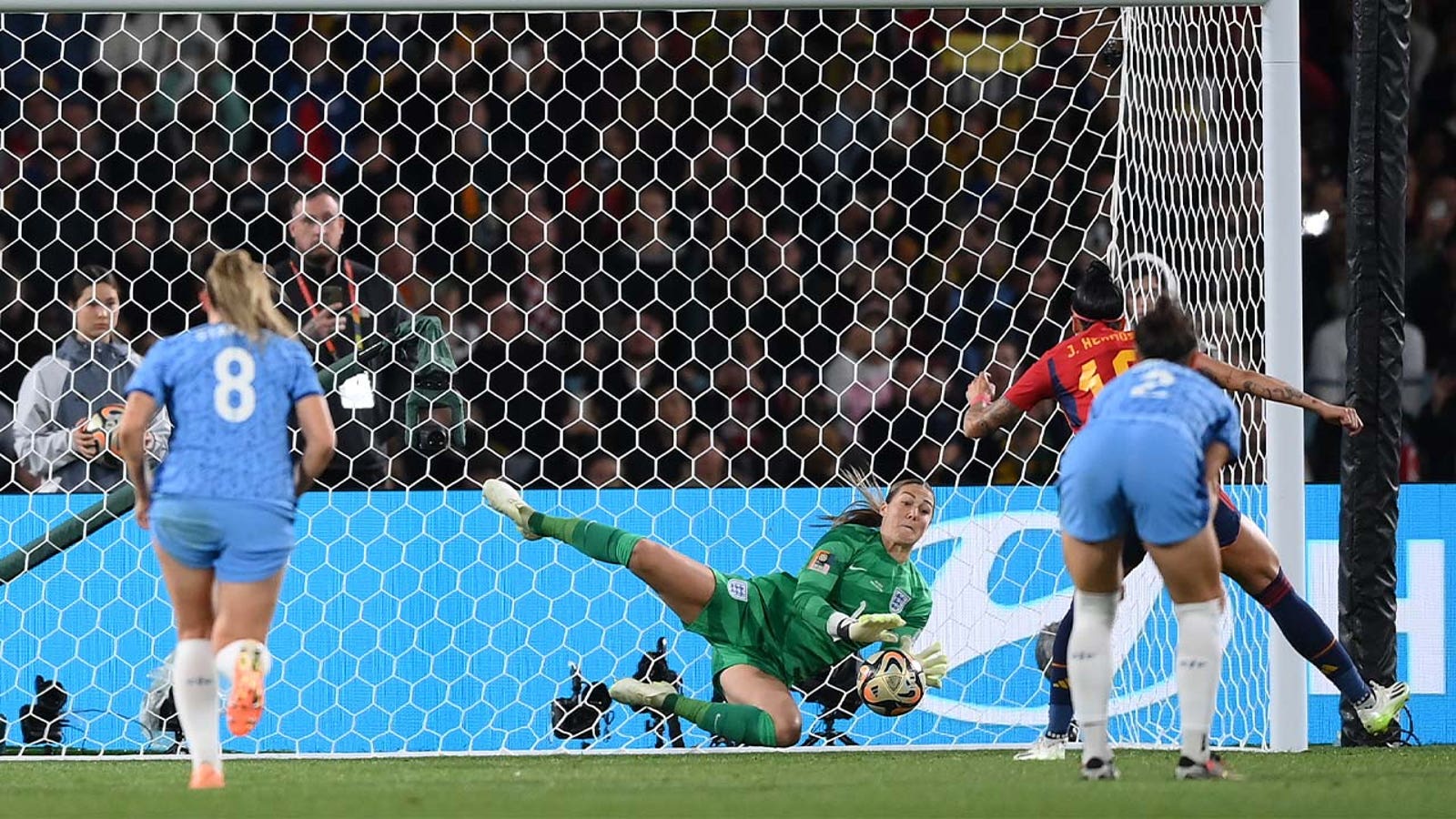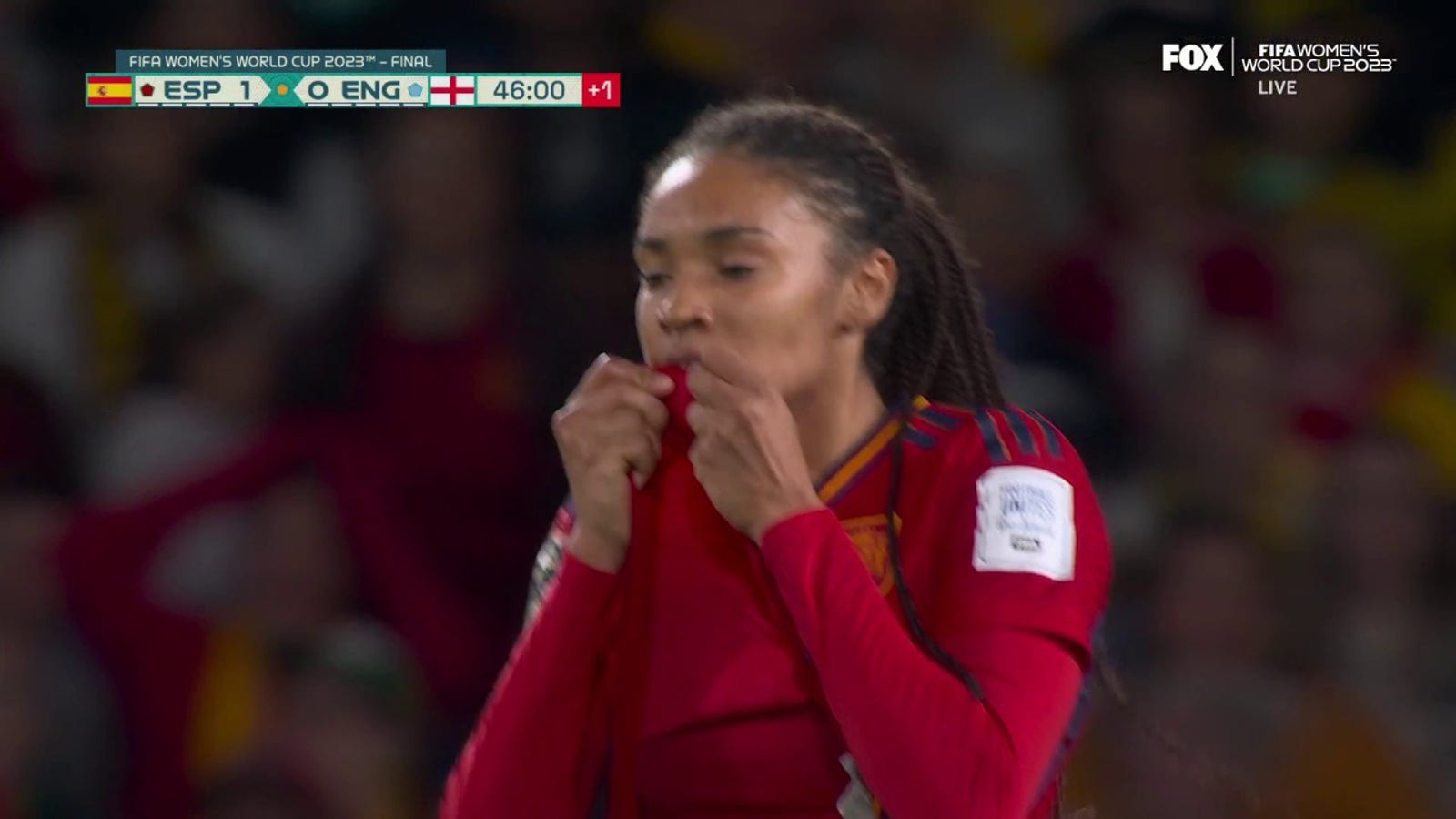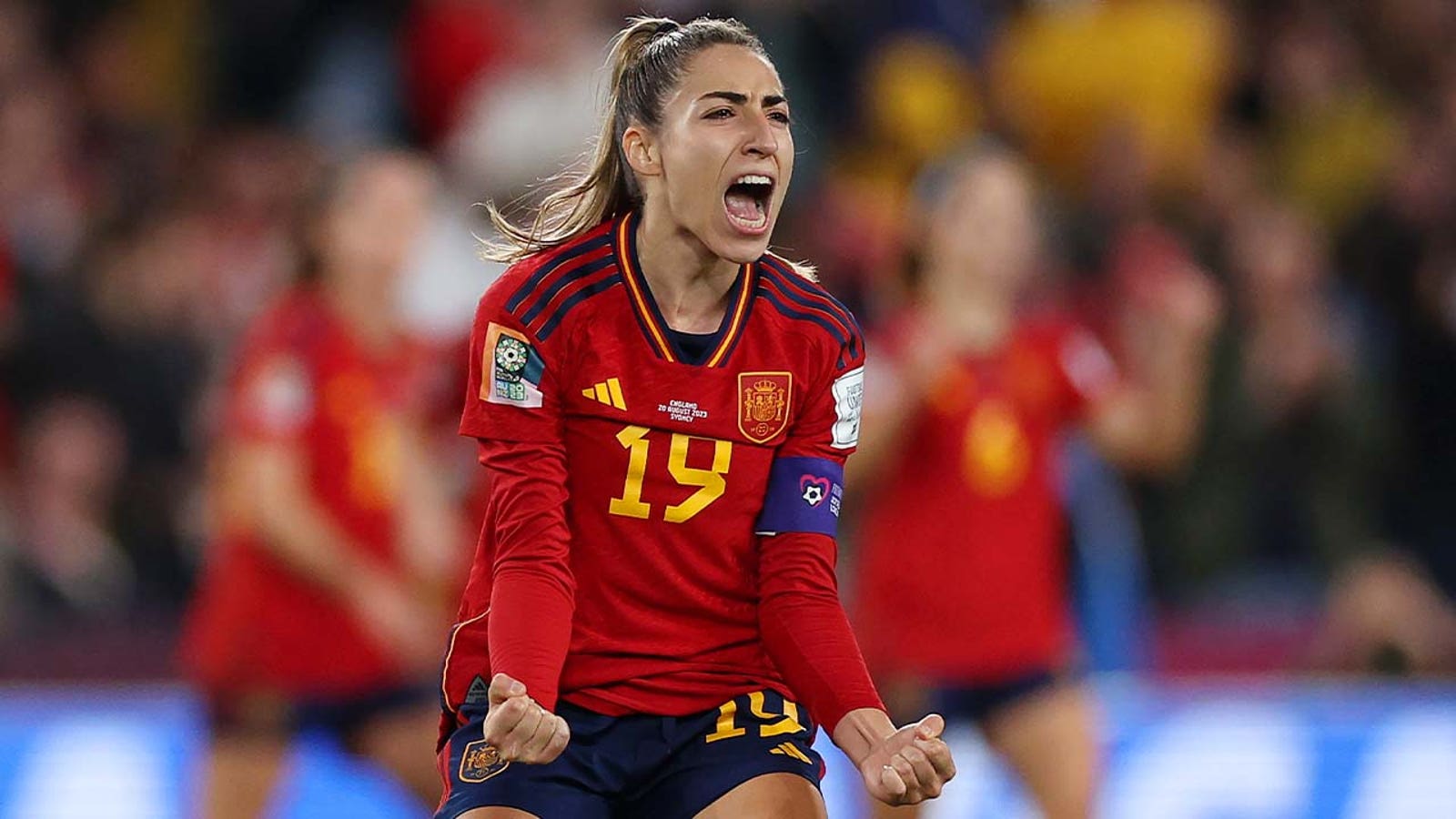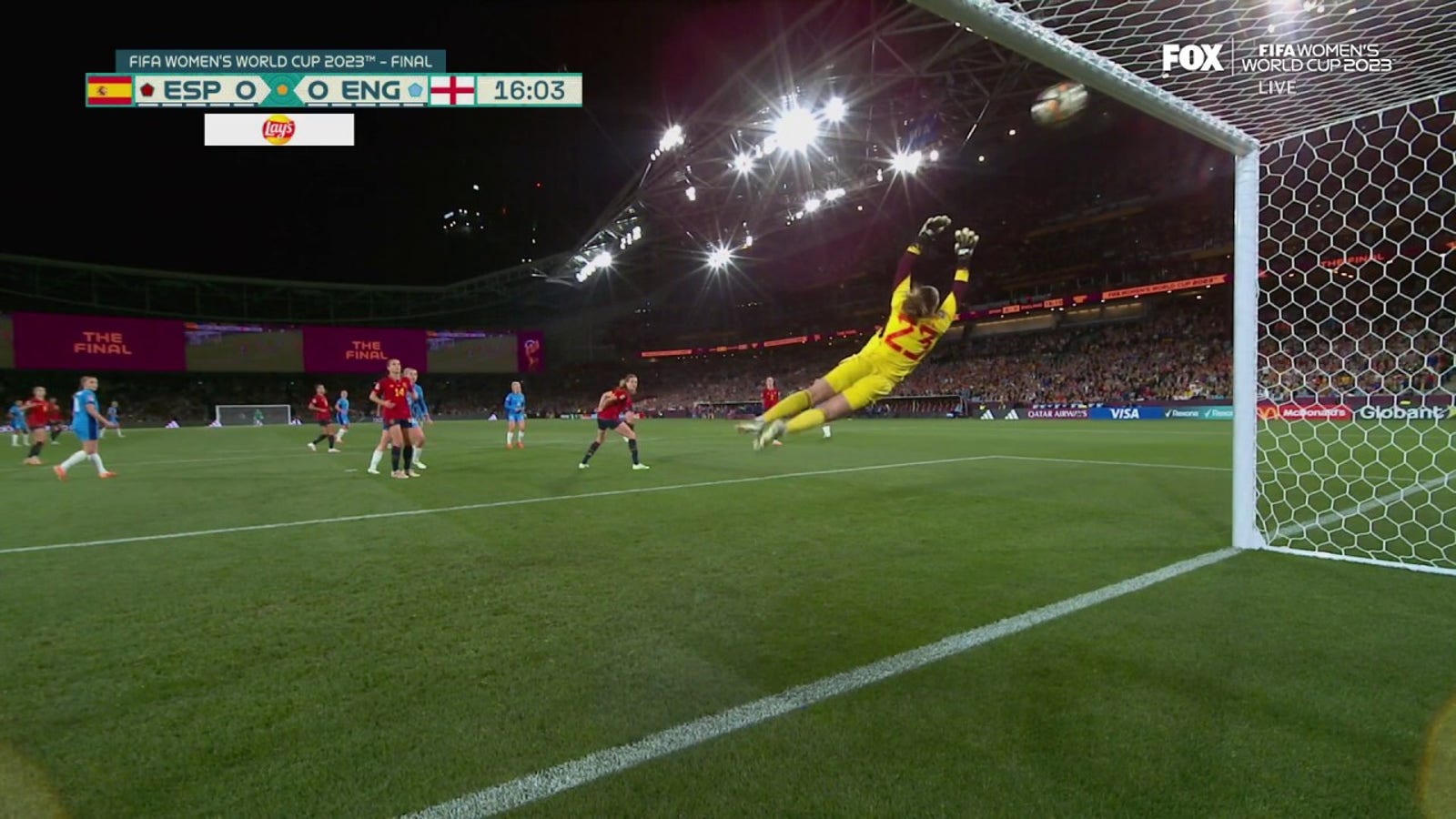
Spain vs. England highlights: La Roja wins 1-0, secures first World Cup title
The 2023 FIFA Women's World Cup came to a close Sunday (on FOX and the FOX Sports app) with a thrilling matchup at Sydney's Stadium Australia, where Spain defeated England 1-0 to win its first ever Women's World Cup title.
Spain survived nearly 15 minutes of stoppage time to secure the victory. A left-footed strike from fullback Olga Carmona in the 29th minute was part of a dominant first half for Spain that proved to be just enough to hold off England.
Spain's win marked the first time a new World Cup champion was crowned since 2011.
Check out our live coverage below, featuring analysis from FOX Sports' Michael Cohen!
Final: Spain is here to stay
In a sign of just how rapidly the game is evolving, Spain hoisted the Women's World Cup trophy for the first time to complete a magical tournament run that showcased a level of technical brilliance and youthful talent that should position La Roja as a force for years to come. The 29th-minute strike from fullback Olga Carmona proved decisive in fiery and physical 1-0 victory over England, the reigning champions of Europe.
A mesmerizing opening 45 minutes from Spain turned the Lionesses forward, backward and inside out as they chased the intricate passing and incisive movements of a squad brimming with fresh-faced stars. The youngest World Cup finalists since 1995, La Roja embodied the growth of women's soccer across the globe by drawing on a roster that included eight players from powerhouse Barcelona and eight more from Real Madrid, two clubs whose incredible resources and high-level coaching have transformed this Spanish side into an aesthetic delight. Spain kept 64% possession in the first half and out-passed England by 303-178 in a performance that paired metronomic rhythm with supreme fluidity, stretching and tearing the Lionesses apart, all of it culminating with Carmona's second goal in as many games.
Though the on-field celebrations were joyous and robust, the emotions of the next few hours and days will likely be complicated for Spain, a nation at odds with its manager, Jorge Vilda. Fifteen players walked away from the national team last September in protest of Vilda's coaching methods and management. Vilda refused to resign when the players demanded he step down, and months later only three of the original protestors were included in the World Cup squad. That La Roja made it to the final — and won it — despite such upheaval and strife should only underscore the impressiveness of their achievement.
But the internal struggles cannot, and should not, overshadow how brilliantly Spain played throughout this tournament, as its possession-based approach became a treasure to behold. Established stars like Alexia Putellas and Aitana Bonmati — perhaps the two best players in world football — were joined by burgeoning talents Salma Paralluelo (19 years old), Eva Navarro (22), Catalina Coll (22) and Carmona (23) in what amounted to a generational collection of firepower and skill. Carmona's wonder strike against Sweden propelled La Roja to the final, and her beautiful left-footed finish against England helped Spain win it.
The Spanish are the best in the world, and there's no question they're here to stay.
97': Closing out with style
Some proper gamesmanship from the Spanish, who were milking every free kick and every stoppage — a few seconds here, a few seconds there. Impressive game management from Jorge Vilda's team. Knowing how to close out games is a skill, and Spain did a nice job.
92': No quit
England began to look leggy and fatigued as stoppage time got underway. Spain began to string together passes for longer spells of possession. All that defending and high-speed counter-attacking England did in the opening 45 minutes was so taxing, and it was fair to wonder if the Lionesses were running out of gas after chasing shadows in the first half.
The one player who continued to look sharp was goalkeeper Mary Earps:
90': Alexia Putellas enters
Spain's two-time Ballon d'Or winner entered in the 90th minute after starting the game on the bench yet again.
78': Zeroing in
Credit to England manager Sarina Wiegman for her halftime changes. The second-half possession numbers now favor England 53% to 47%, while the introduction of Lauren James and Chloe Kelly really gave the Lionesses some pace and some life on the flanks. A significant turnaround from the opening 45 minutes.
70': Denied!
Jennifer Hermoso's shot was saved by Earps, who dove to her left and caught the shot. A poorly taken penalty kick by Hermoso — shot didn't have enough pace, nor was it close enough to the corner — but credit to Earps for guessing correctly and making the crucial save.
That was the third penalty in a Women's World Cup final (excluding shootouts) all-time and the second to be saved.
Mary Earps makes the save on Jennifer Hermoso's penalty kick
Still a long way to go, but a good bit of stoppage time can be expected once this game reaches 90 minutes due to the lengthy VAR review, the multiple substitutions by Spain and a player down injured. The referee already pointed to her watch to let the England bench know that she's monitoring all the stoppages thus far.
68': Handball
A lengthy VAR check sent the referee to the monitor to review a potential handball in the box against England's Keira Walsh. The ball struck Walsh's right hand as she lunged toward her right to impede Mariona Caldentey. The review took several minutes, and the end result was a penalty kick awarded to Spain — a massive, massive decision.
60': Spain makes changes
Spain manager Vilda made his first change of the second half by replacing right-winger Alba Redondo with Oihane Hernandez, which was an interesting move considering Hernandez primarily plays as a defender. She was slotted in along the right wing where Redondo had been playing. Perhaps Vilda wanted a more defensive-minded player in that position as Spain continued to protect its 1-0 lead.
54': Huge chance!
England was performing much better in the first few minutes of the second half. Kelly, one of the halftime substitutes, whipped in a beautiful cross against the high Spanish back line. Lauren Hemp got on the end of the cross at the back post but was unable to direct it on frame. A golden opportunity for England went awry but creating that kind of chance so early in the half should instill some confidence for a team that desperately needs it.
An early look at James and Kelly through the opening 12 minutes of the second half showed that they were doing what Wiegman wanted them to do: stretch the field laterally by providing width in the attack. James had more of a license to drift infield than Kelly, who was essentially playing along the touchline.
48': Mixing it up
Sure enough, Wiegman made two personnel changes and a formation change at the break. Attackers James and Kelly replaced Alessia Russo and Rachel Daly, respectively, as England shifted to playing four in the back for a revised formation of 4-4-2.
Halftime: What a clinic by Spain
Vilda's team had thoroughly outclassed England through 45 minutes on both ends of the pitch. Offensively, Spain kept 64% possession and out-passed the Lionesses by 303-178. The Spanish had a 5-2 edge in total shots, a 2-0 edge in big chances and teenage sensation Salma Paralluelo struck the outside of the right post just before halftime. Had that ball snuck inside the post, England would have been in a world of trouble at 2-0 down.
Defensively, the waves of pressure from La Roja gave England all kinds of problems. Walsh, Ella Toone and Alex Greenwood were the only English players with at least 80% passing accuracy Sunday, while the Spanish had seven such players. The high press from Spain made it difficult for England to play out from the back, which forced the Lionesses to rely on speculative long balls toward forwards Russo and Hemp. And the counter-press from Spain, which rockets into gear the moment La Roja gives the ball away, afforded England no time to breathe and reset.
There was plenty for Wiegman to ponder at halftime. Does she commit to playing a lower block defensively and fortify the penalty area with extra bodies? Does she change shape by converting from a back three to a back four? Does she introduce star attacker James? There are no easy answers for a team that struggled to keep possession and dedicated 17.4% of its passes to low-percentage long balls in an effort to generate counter-attacks.
46': Building momentum
Best spell of possession for England in terms of passes strung together, but the Lionesses were unable to advance the ball out of the defensive third. All they could manage was to play the ball from defender to defender, defender to midfielder, with nothing to break the Spanish lines and push forward.
Meanwhile, the high press and counter-press from La Roja was really causing problems for Wiegman's team. Nearly every location on the field where Spain won tackles came in England's half of the field, demonstrating just how potent and effective its pressing/counter-pressing has been.
Salma Paralluelo gets off a shot on goal that hits the post in 46'
29': GOAL! Spain leads 1-0
Two games, two goals for Carmona. It was her strike from outside the box that propelled Spain into the final, and now she surged into the box for a low finish into the bottom-right corner after a turnover from England in the middle of the park. Beautiful placement and control.
Spain is 5-0-0 (W-D-L) in this tournament when scoring first, and 5-1-1 all-time when doing so. What's more, Carmona is the seventh player all-time to score in the semifinals and the final at the same Women's World Cup and is the fourth-youngest goalscorer in a final at 23 years and 69 days old (and the youngest since Alex Morgan in 2011).
Spain's Olga Carmona scores goal vs. England in 29'
What was interesting about how the game had unfolded up to that point was England's clear intention to counter-attack at maximum speed whenever it won possession. Most people assumed Spain would win the possession battle, but England was compounding that discrepancy by playing at 100 miles per hour and hardly even trying to keep the ball. As soon as Spain turned it over, England was going direct to goal with counter-attack after counter-attack.
It was a bit surprising and a strategy that opened the Lionesses up to early fatigue. Fair to wonder if manager Wiegman will tweak that approach at halftime. Might England be better served by forcing Spain to defend for longer stretches? Teams with less possession can still keep the ball for short spells without going straight to goal.
20': Back and forth
An early heatmap for Spain showed a clear intention to build down the left-hand side with the trio of Carmona — who scored what proved to be the winning goal in the semifinals on a fizzed shot from outside the box — Hermoso and Caldentey working some excellent combinations to stretch England's defensive shape.
A real cat-and-mouse game in strategy in the first half.
16': Woodwork!
A beautiful layoff by England wingback Daly on the left side of the penalty box teed up a first-time shot from Hemp. The shot had Spanish goalkeeper Cata Coll beat but rattled off the crossbar in what was the chance of the match for either team up to that point.
England's Lauren Hemp NEARLY scores against Spain in 16'
15': Finding a rhythm
Early possession numbers: 58% and 78 passes for Spain, 42% and 42 passes for England.
England will have to be content to play on the counter-attack.
9': Eyes on the prize
Spain has been the best team in this year's tournament at keeping the ball and dominating matches with volume passing.
For England, playing a more defensive game and keeping a shape for long stretches without the ball isn't something the Lionesses do very often. One thing to keep an eye on early was how England responded to having less possession than in past games.
5': On the move
The introduction of Paralluelo into Spain's starting lineup dropped forward Hermoso back into more of a center-attacking, midfield role. She occupied the space behind Paralluelo when Spain was in possession and appeared to have a license to float from side to side and get on the ball wherever possible.
Meanwhile, Hemp took an early shot for the Lionesses, but Coll had other plans.
1': We're off!
Just like that, things got underway in Sydney, and the competition was heated from the very start.
PREGAME
Setting the stage
The "World Cup NOW" crew and FOX Sports lead soccer analyst Alexis Lalas previewed the match live on social media ahead of kickoff.
Star power
Key players for England included forward Russo, defender Lucy Bronze and star goalkeeper Earps.
Heading into Sunday's final, Russo was tied for the team lead with three goals in this tournament and led all players at the World Cup in total shots (22) and shots on target (12). She also led England in progressive passes (48). Bronze, a wingback in Wiegman's 3-4-1-2 formation, led England in interceptions (14) and crosses into the penalty area (five) and ranked second on the team in recoveries (48) behind midfield star Georgia Stanway.
Last but not least, Earps enjoyed a strong tournament with a mark of 1.6 goals prevented, which was tied for fifth among all goalkeepers at this year's World Cup, and three clean sheets posted ahead of Sunday's tilt.
Key players for Spain, which boasted an average age of just 25.3 — the youngest among World Cup finalists since 1995 — included forward Paralluelo, forward/midfielder Hermoso and midfielder Teresa Abelleira.
Heading into Sunday's final, Paralluelo led the World Cup in successful take-ons (21) and was tied for fifth in shot-creating actions with 23, a reflection of her willingness to drive at opposing defenses. Hermoso, a leading figure for Spain's attack, was tied for the team lead in both goals (three) and assists (two); she was tied for third overall at this year's tournament with 14 passes into the penalty area and tied for second in expected assists with 1.8.
Abelleira, the central figure in Spain's possession-based approach, led all players at the World Cup in progressive passes with 57 and was tied for first in shot-creating actions with 33 ahead of Sunday's tilt. Her pass success rate of 87% led all Spanish players who had completed more than 175 passes at this year's tournament.
Spain and England walk outs, national anthems at Women's World Cup final
Starting lineups
England manager Wiegman went with the same lineup she used in the Lionesses' quarterfinal and semifinal victories, meaning 23-year-old attacking midfielder Toone got the nod again Sunday over James — one of the breakout stars of the tournament's group stage who was eligible to return for the final after serving a two-game suspension. James had scored or assisted on six of England's 14 goals at this tournament prior to the final.
James received a red card in the round of 16 and was unavailable for both the quarterfinals and semifinals, as the Lionesses moved past Colombia and Australia, respectively.
[Related: England star Lauren James will not start in first game back from suspension]
Putellas, who has spent most of her tournament waiting in the wings, also began the game on the bench. Instead, 19-year-old breakout star Paralluelo got the start after coming off the bench — and scoring — in the last two matches.
[Related: How Salma Paralluelo went from track star to Spain's World Cup game-changer]
Check out the full Women's World Cup schedule here. Find the latest scores here.





